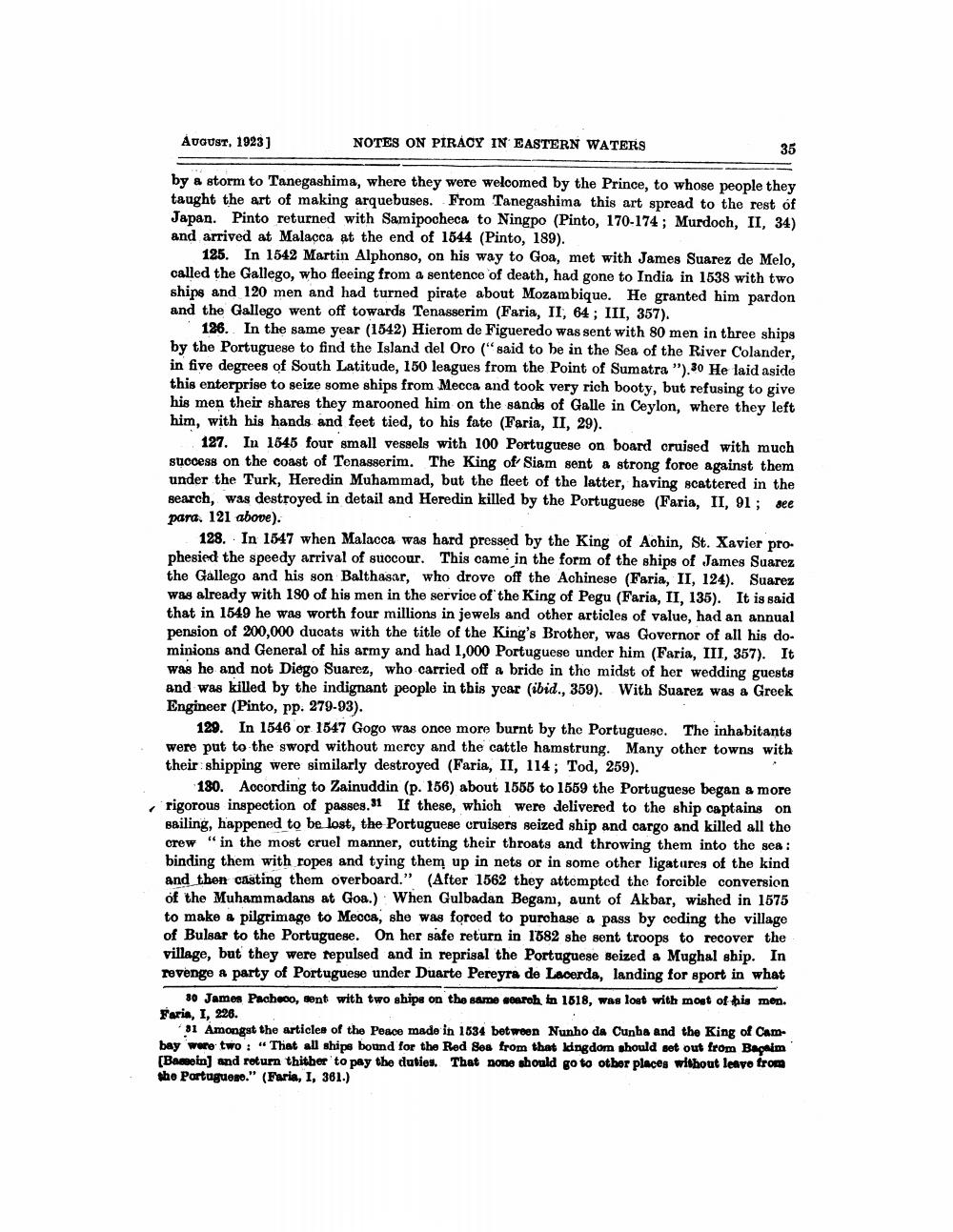________________
AUGUST, 1923]
NOTES ON PIRACY IN EASTERN WATERS = by & storm to Tanegashima, where they were welcomed by the Prince, to whose people they taught the art of making arquebuses. From Tanegashima this art spread to the rest of Japan. Pinto returned with Samipocheca to Ningpo (Pinto, 170-174; Murdoch, II, 34) and arrived at Malacca at the end of 1644 (Pinto, 189).
125. In 1542 Martin Alphonso, on his way to Goa, met with James Suarez de Melo, called the Gallego, who fleeing from a sentence of death, had gone to India in 1538 with two ships and 120 men and had turned pirate about Mozambique. He granted him pardon and the Gallego went off towards Tenasserim (Faria, II, 64 ; III, 357).
126. In the same year (1542) Hierom de Figueredo was sent with 80 men in three ships by the Portuguese to find the Island del Oro ("said to be in the Sea of the River Colander, in five degrees of South Latitude, 150 leagues from the Point of Sumatra").30 He laid aside this enterprise to seize some ships from Mecca and took very rich booty, but refusing to give his men their shares they marooned him on the sands of Galle in Ceylon, where they left him, with his hands and feet tied, to his fate (Faria, II, 29).
127. In 1645 four small vessels with 100 Portuguese on board cruised with much success on the coast of Tenasserim. The King of Siam sent a strong foroe against them under the Turk, Heredin Muhammad, but the fleet of the latter, having scattered in the search, was destroyed in detail and Heredin killed by the Portuguese (Faria, II, 91; see para. 121 above).
128. In 1647 when Malacca was hard pressed by the King of Achin, St. Xavier pro phesied the speedy arrival of succour. This came in the form of the ships of James Suarez the Gallego and his son Balthasar, who drove off the Achinese (Faria, II, 124). Suarez was already with 180 of his men in the service of the King of Pegu (Faria, II, 135). It is said that in 1549 he was worth four millions in jewels and other articles of value, had an annual pension of 200,000 ducats with the title of the King's Brother, was Governor of all his do minions and General of his army and had 1,000 Portuguese under him (Faria, III, 357). It was he and not Diego Suarez, who carried off a bride in the midst of her wedding guests and was killed by the indignant people in this year (ibid., 359). With Suarez was a Greek Engineer (Pinto, pp. 279-93).
129. In 1546 or 1547 Gogo was once more burnt by the Portugueno. The inhabitants were put to the sword without mercy and the cattle hamstrung. Many other towns with their shipping were similarly destroyed (Faria, II, 114; Tod, 259).
180. According to Zainuddin (p. 156) about 1555 to 1559 the Portuguese began a more rigorous inspection of passes. 31 If these, which were delivered to the ship captains on sailing, happened to be lost, the Portuguese cruisers seized ship and cargo and killed all the crew" in the most cruel manner, cutting their throats and throwing them into the sea : binding them with ropes and tying them up in nets or in some other ligatures of the kind and then casting them overboard." (After 1562 they attempted the forcible conversion of the Muhammadans at Goa.) When Gulbadan Begam, aunt of Akbar, wished in 1575 to make & pilgrimage to Mecca, she was forced to purchase a pass by ceding the village of Bulsar to the Portuguese. On her safe return in 1882 she sent troops to recover the village, but they were repulsed and in reprisal the Portuguese seized a Mughal ship. In revenge a party of Portuguese under Duarte Pereyra de Lacerda, landing for sport in what
30 James Pacheco, tant with two shipe on the same search to 1618, was lost with most of his men. Faria, I, 226.
31 Amongst the articles of the Peace made in 1634 between Nunho da Cunha and the King of Cambay were two : "That all ships bound for the Red Sea from that kingdom should set out from Bagaim (Bassein) and return thither to pay the duties. That none should go to other places without leave from the Portuguese." (Faria, I, 361.)




